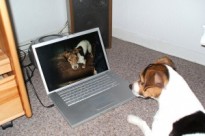….You can surf the web in your pajamas!
These expressions as old as the internet – which isn’t THAT old. But, still, old in internet days. The snappy phrases indicate anonymity – a lonely individual, sitting in the comfort of home, maybe multitasking while watching a movie and taking on the phone, connecting to the worldwide resources. However, the popularity of search sites, such as Google, and social media sites like Facebook has meant that we are hardly anonymous. Whether we like it or not, we create an online identity, saving photos, setting preferences, voting with likes and dislikes. Many of us use our own names and include a flattering picture of ourselves, or of our pets, or friends. If someone wanted to find us, it wouldn’t be too hard. And if we did something hurtful or illegal, our computer tracks would lead directly to us.
It appears that is now changing. Yik Yak is a relatively new Twitter-like app for phones that requires registration with only a phone number. No names, no pictures, nothing else. All Yik Yak users post anonymously. I don’t know if the phone number can be made up, or if anyone checks to make sure you are the owner of the phone number. On the surface it is a good way to announce emergencies, or events, especially since it appears to be location-based. “New flash mob going on- come on down!” However, it also makes it easy to spread hateful or even obscene messages. For this reason, Yik Yak was banned from some high schools, even before the founders implemented geo-location which, basically, “turned off” the application in the vicinity of high schools. The easy possibility of cyber bullying and its unfortunate consequences was uppermost in school administrator’s minds.
This seems to present us with a dilemma. We want to preserve our privacy online. But what does “privacy” mean on the internet. Can we keep our preferences and our personal information “private” and still use the internet’s vast resources? Can we be free to express ourselves and our opinions without retribution, or tracking by marketers, or having to worry that our thoughts are forever tracked? Can we be “anonymous?” And, if we allow true anonymity, can we be free from worry that it will be exploited?
Image: Feeling fresh again by Samuel John uploaded to flickr.com, January 9, 2011

